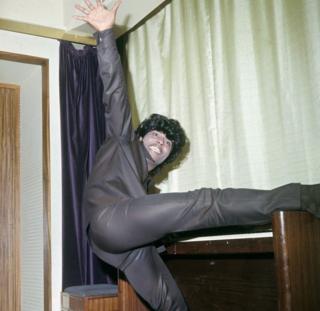Little Richard: What did ‘A-wop-bop-a-loo-bop’ actually mean?
 Image copyright
Image copyright
Getty Visuals
Little Richard’s first strike is just one of the defining tunes of rock ‘n’ roll
“A-wop-bop-a-loo-bop, A-lop-bam-increase!”
Sixty-5 years back, “Little” Richard Penniman walked into J&M Studios in New Orleans and established about recording some new audio for Speciality Records.
By this phase, he’d been in the enterprise for four years, seeking and failing to report hits for the rival labels RCA and Peacock. By all accounts, the session on 14 September 1955 was not about to reverse his fortunes.
Soon after an unproductive early morning in which 5 mediocre gospel tunes have been dedicated to tape, producer Bumps Blackwell called proceedings to a halt and, as legend has it, the musicians decamped to a nearby bar.
There, Little Richard noticed a piano and, far more importantly, an audience. The 22-calendar year-old sat down and performed an old, a little bit obscene ditty he’d often performed as filler when he performed nightclubs.
“He strike the piano and hollered, ‘A-wop-bop-a-loo-bop-a-excellent-God-damn!'” Blackwell later on recalled. “And people have been the cleanest phrases of it”.
- Rock ‘n’ roll pioneer Little Richard dies
- Obituary: Little Richard
Inspite of the lyrics – which have been fundamentally a tribute to anal sex – the bar went wild, and Blackwell knew he had a strike on his fingers.
The phrases have been hastily rewritten by local musician Dorothy LaBostrie, who changed “excellent booty” with “aw rootie”, a slang edition of “all righty.” Other provocative traces have been sanitised with references to ladies named Daisy and Sue.
That ecstatic, rhythmic, a capella intro remained almost completely intact, nevertheless, with only the blasphemous portion excised.
But what does it suggest?
Image copyright
Getty Visuals
The star was a wild, unrestrained drive on phase
Most people today think it is a load of old codswallop-a-lop-bam-increase – an outlet for the primal, pent-up electrical power that erupted from Little Richard’s soul each individual time he sang.
An alternate theory is that the cry is actually a vocal approximation of a drum crack, building Little Richard just one of the earliest beatboxers on report.
But speaking to Rolling Stone journal in the seventies, the star mentioned the phrase actually commenced out as a sneaky way of cursing at his manager.
“I was doing the job at the Greyhound bus station in Macon, Ga,” he recalled, “and I couldn’t discuss again to my manager, male.
“He would provide all these pots again for me to clean, and just one day I mentioned, ‘I’ve received to do something to stop this male bringing again all these pots to me to clean,'” he recalled.
“And I mentioned, ‘A-wap-bop-a-lup-bop, A-wop-bam-increase, take ’em out!‘ and which is what I intended at the time.
“So I wrote Tutti Frutti in the kitchen, I wrote Great Golly Overlook Molly in the kitchen, I wrote Lengthy Tall Sally in that kitchen.”
Even right after the report sold a million copies, Little Richard believed in the phrase’s anti-establishment efficiency.
He even claimed to have shouted it in the deal with of former Alabama governor George Wallace, a staunch segregationist who Martin Luther King as soon as referred to as “possibly the most dangerous racist in America nowadays”.
Little Richard’s verbal assault built minimal effect, on the other hand. “He did not know what I meant… and neither did I,” the singer recalled.
As a substitute, “A-wop-bop-a-loo-bop” became the clarion simply call for a new musical movement.
With the lyrics hastily censored, Little Richard and Bumps Blackwell lower Tutti Frutti in just a few takes at the end of his session.
The report lastly captured his incendiary, outrageous on-phase persona – and in 10 times of its launch, the track had shifted 200,000 copies. By 1968, it had sold 3 million in America on your own.
Due to the fact then, the track has been called the “solitary biggest rock report”, “just one of the detonating blasts of the ’50s rock ‘n’ roll explosion” and “the seem of an incomprehensible drive”.
In 2009, the authentic recording was preserved for posterity by the US Library of Congress. “Even in the significantly less suggestive edition that was ultimately launched, Little Richard’s unique vocalizing about the irresistible defeat announced a new era in audio,” it noticed.
It can be been lined hundreds of situations, by every person from The Beatles and Elvis Presley to Alvin and the Chipmunks, and it turned dozens of musicians on to rock ‘n’ roll.
Otis Redding, Bob Dylan, Freddie Mercury and James Brown – who commenced out as a Little Richard impersonator – all cited Little Richard as a crucial influence.
“Little Richard is a excellent originator. He was suitable there at the start out, a thrilling performer,” mentioned Chuck Berry.
“No person could defeat Little Richard’s phase act,” mentioned Mick Jagger. “Little Richard is the originator and my first idol.”
The star died of bone cancer on nine May possibly, 2020
His legacy “has been felt in other techniques, far too,” wrote Cary O’Dell in an essay for the Countrywide Recording Registry in 2009.
“Due to the fact Tutti Frutti, rock audio has shown a high tolerance for gibberish-y or non-sequitur tunes.”
So with no Little Richard’s invented curse phrases, we wouldn’t have The Crystals’ Da Doo Ron Ron, Manfred Mann’s Doo-Wah Diddy, Gene Vincent’s Be-Bop A-Lula, or even Girl Gaga’s Bad Romance.
No question Rolling Stone as soon as called it “the most influenced rock lyric on report”.
Comply with us on Fb, or on Twitter @BBCNewsEnts. If you have a story recommendation e mail [email protected] kingdom.
